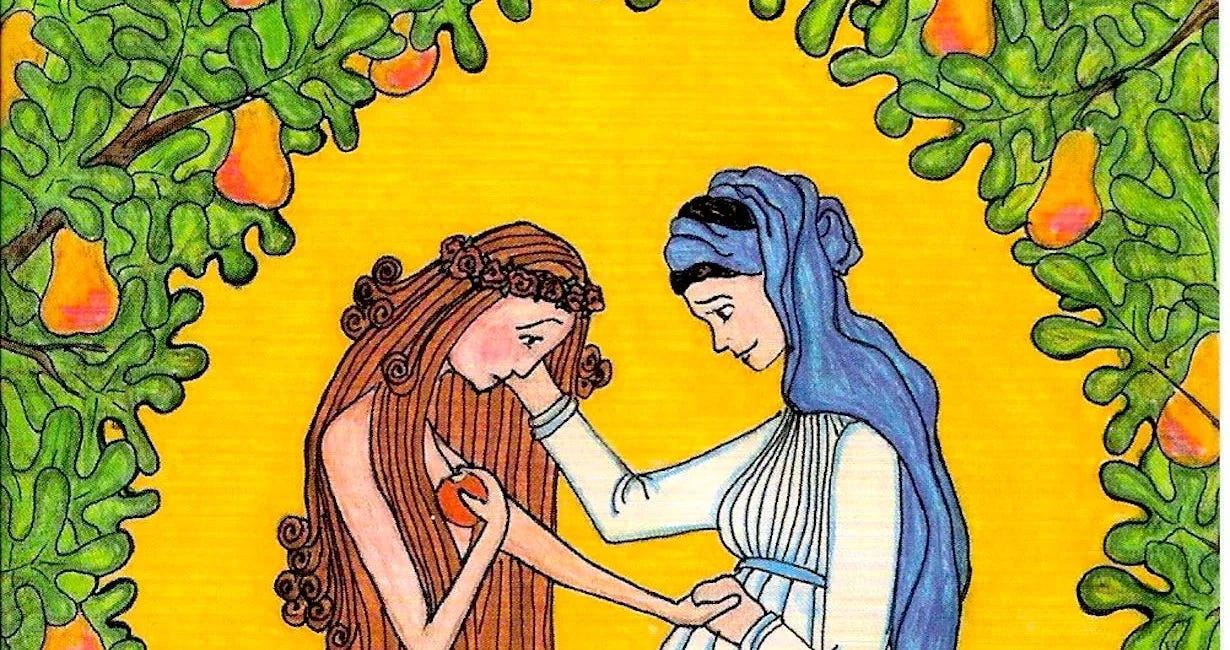Public Theology is based on the work of Zach W. Lambert, Pastor of Restore, an inclusive church in Austin, Texas. Zach’s first book, Better Ways to Read the Bible, will release on August 12, 2025 and is available to preorder today. All of the content available at Public Theology is for those who identify as Christian, as well as those who might be interested in learning about a more inclusive, kind, thoughtful Christianity. We’re glad you’re here.
Vacation Bible School (VBS) was a staple of my childhood summers.
My favorite VBS was in 1996, the year I turned seven. It was the summer of the Atlanta Olympics and “The Magnificent Seven,” the female gymnastics team I grew to love so much that I received VHS tapes of the coverage of their events the following Christmas. I watched those tapes on repeat for years following, and I still love the Olympics, something I have gladly passed on to my kids. (And if you haven’t watched Dominique Moceanu’s floor routine to Devil Went Down to Georgia, now is the time.)

My small town church put on an Olympics-themed VBS that year, with competitions tied to memory verses and character-based awards. We each got handmade medals (think gold foil yogurt lids with a red, white, and blue ribbon)— someone made each of those medals with her own two hands (it was surely a woman), using a sharpie to write a personalized trait on each one.
I had to miss the last two days of VBS to get my tonsils and adenoids removed, and I was devastated. My volunteer teacher– who was also my friend’s mom and my mom’s friend– knew how I felt. She gave me a medal on my last day of VBS before my surgery with the word BRAVE written in all caps across shiny the shiny gold medallion. It hung on my parents’ fridge until they moved last year, almost thirty years later.
Sadly, the love I felt for church at age 7 had changed by 17, when I was attending a Baptist University. I was as devoted as I had ever been, but the college’s legalism was wearing me out. The rules had become too much even for a good church girl like me. I felt suffocated in my shared 10x12 cinder block dorm room. Zach visited me one time that semester and was allowed in my room between the hours of 6pm & 9pm if he left his driver’s license with the RA upon checking in and we agreed to follow the three dorm rules: door open, lights on, feet on the floor.
Christian college was like a church camp that never ended, except the camp high couldn’t be sustained over an entire semester, at least not for me. I was in a bible study with the girls on my floor. One of the “cool” upperclassmen had a sticker on his laptop that said “God’s book before Facebook” to keep him accountable to his daily quiet time (and we all knew it). Chapel, where we had to swipe our student IDs for attendance, was required three times a week.
It was at one of these chapels where I sat within the vicinity of someone I loosely knew from my home church. He had been away on a “mission” of sorts with a traveling revival group (I promise this is a true story), so he wasn’t around when I was in high school and had started college just before me in his early twenties; I had turned seventeen just months before. After this chapel service, I chatted with some friends and somehow started talking to this man who proceeded to tell me that when his [future] wife (he was not dating anyone at the time) had kids, she would not get an epidural.
Just sit with that for a second. A man said this to me when I was not even a legal adult.
I don’t know if this was an interview (“ring by spring” was a common refrain) but I openly disagreed with his mandate. He was offended by my defiance. Life moved on. I later saw that he married a girl I knew in college– a girl who was known for being a bit of a wild child– and she became the natural-birthing wife he felt confident he deserved.
Thank God I wasn’t that girl.
Fifteen years later, I had deconstructed much of my religious upbringing. My boys had never attended a VBS because I didn’t trust the churches who put them on, but my friends assured me that it would be fine, their kids had been to the one down the road every year and loved it, that fifteen hours of free childcare was a good thing.
And everything was mostly fine. Other than the cross shaped donation box that the children’s director used to count every single penny donated by the children for “church planting like minded churches” (red flag), I didn’t think much of it. I fished for info every afternoon, but they gave me nothing worth worrying about until a few weeks later, when my then-four-year-old son asked me, “Mommy, why was I so bad that they had to stick thorns into Jesus’s head?”
I cried. I’ll never send them back, there or anywhere else.
Much of my deconstruction centered around this the thing that I didn’t want my children to internalize the way I had: the framing of Jesus’s death on the cross being my fault. To hear my little boy ask that question felt like a failure in parenting, like I had betrayed my children for thirty pieces of silver… or a few hours of alone time in late July. It brought things back up within me, too.
The violence of Evangelicalism has always bothered me, but I was made to feel that I was the problem. I was always a little too sensitive about everything, especially God’s wrath. I tried to suck it up and be a good girl but I lived in constant fear. I am not advocating for a certain atonement theory here, but I can guarantee that my understanding of myself as a wretched sinner in the hands of a just God had something to do with my anxiety, and eventually, my deconstruction.
Unsurprisingly, my deconstruction reevaluated God’s requirement of bloodshed to appease his wrath. I still don’t like the cross as a vehicle for forgiveness, but I have been exposed to broader theories on the what, how, and why behind it. I still don’t get why this was the way that it was, but I believe it truly happened and that it wasn’t the result of an angry God with an inability to control his violent tendencies.
Several years ago, on an episode of Armchair Expert, of all things, one of the Christian guests (I can’t remember who) shared that one of the things he loves about the bible is its commitment to showing the breadth of the human experience: the good, the bad, and the ugly. I had never thought of it that way before, but it meant something to me on that day and it still does.
Scripture is not a fairy tale or God’s personal love letter to me; it is the tell-all account of a group of real humans trying to make it in the world, and the God who pursues them regardless of their wandering. I still don’t know what to do with some of the passages, but I have a better understanding of the canonization process, the oral tradition of ancient people, and the intention behind different types of writing within those pages.
Whether I agree with death as punishment or not, criminal deaths were a part of life during biblical times just as they are today. Jesus’s unwarranted arrest and lack of due process, his fate being decided by a bloodthirsty mob, is not so distant as to be unrecognizable to most of us in the twenty-first century. The Roman leaders didn’t appreciate the trouble he was stirring up, as it threatened their power, so his death was a question of when, not if.
He knew from the moment he first spoke of God’s kingdom that he was doomed, but he did it anyway.
David Gushee
The leaders needed to quash the impending uprising. Jesus rode into Jerusalem on a Sunday, and he was dead by Friday. This story, as horrible as it is, is not new: a Revolutionary starts stirring up revolution, so the Revolutionary is killed.
Yet– Jesus rose from the dead. He inverted the power structure in a way that no political uprising ever could. I don’t know how I believe in this physical resurrection, but I do. I have experienced supernatural things beyond human understanding, and I believe these are of the same power that raised Jesus from the dead. There was a point in time during my deconstruction, in the languishing of taking a hard look at everything I had once believed, where I thought I would never believe any of it again. It was one of the more scary, lonely experiences of my life. But the violence was too much, the trauma too great. As I began to deconstruct God as murderer, doors opened for me to relearn his true character as embodied by Jesus of Nazareth. I saw the cross as a means to God revealing his love for all mankind rather than a vicious punishment meant for me.
There’s a part of me that feels deep compassion for those who have been misled by the Evangelical church, but I no longer have a tolerance for the violence preached by those who are actively benefiting from it.
For example: as wildfires ravaged California last year, a friend of a friend of a friend stated that the San Francisco fires were surely God’s punishment for the “homosexual activity” the city had celebrated. We find this horrific, but here’s the truth: if someone believes that God intends for most of the population to burn in a literal, eternal hell (not them, of course, but other people), it’s not a stretch for that person to be less than compassionate toward the burning of actual people in an actual city on earth. When you believe that God wants to murder all of us in criminal deaths, you lose the ability to see your lust for violence as wrong. “Crucify him,” they chanted, even after they were given the option to choose the other guy.
I believe this is one of the fault lines that separates Evangelicals from Former Evangelicals (or Post Evangelicals). If you believe in a punitive God, with yourself as deserving of punishment, you will see others as deserving of the same. Conversely, if you see God as primarily loving, with yourself as deeply beloved, you will see others as worthy of love. We can disagree about a lot of things and still be on the same team, but I wonder about this particular belief. We’ve seen the fruit of God as punisher and it is rotten.
But the fruit of seeing God as good, loving, kind, gracious, patient, and compassionate can truly change lives. It changed mine. I had to see God as good before I could see myself as deserving of goodness. This understanding was my ticket out of judgment and condemnation for others, no matter how many years I had prayed to stop gossiping, judging those around me, etc. Get the log out of your own eye, Jesus says, but we can’t see others rightly if we don’t see ourselves rightly first.
In my experience, my rightsized perspective of myself came from God. This God compels me to seek beauty and goodness for everyone, not from a place of superiority as I once did (which was just a defense mechanism against the shame I felt), but out of true love that comes from something beyond myself.
I still have anxiety, but it doesn’t come from a deep fear that I’m not good enough for God’s love, or that I may have unintentionally angered God to the point of eternal torment in hell, despite my best efforts. This is not the story I read in scripture any longer, praise be to God.
When I see a man requiring his theoretical wife to undergo childbirth without the option for pain medication (for a pain he could never possibly know), I name violence. When I read about the gymnastics coach that pushed Kerri Strug, an eighteen-year-old American gymnast during the 1996 Olympics, to continue competing when she had torn ligaments in her ankle, and the subsequent cheering for her as hero when she ignored her pain and her inner voice for the entertainment of the world, I question our ethic of wellness (and heroism, and coercion). When I watch a “Christian” tout deadly weapons for the purpose of intimidation, I see toxic religion aligned with the need for power. When I hear a preschooler ask why he’s so bad that he killed Jesus, I feel the crushing effects of harmful theology and the beginnings of self-loathing.
But it doesn’t have to be this way. I’m proof.
More articles like this one:
He First Loved Us
Public Theology is based on the work of Zach W. Lambert, Pastor of Restore, an inclusive church in Austin, Texas. Zach’s first book, Better Ways to Read the Bible, will release on August 12, 2025 and is available to preorder today. All of the content available at Public Theology is for those who identify as Christian, as well as those who might be interested in learning about a more inclusive, kind, thoughtful Christianity. We’re glad you’re here.
Rethinking the Cross
Public Theology is based on the work of Zach W. Lambert, Pastor of Restore, an inclusive church in Austin, Texas. Zach’s first book, Better Ways to Read the Bible, will release on August 12, 2025 and is available to preorder today. All of the content available at Public Theology is for those who identify as Christian, as well as those who might be inter…
The Scandal of Grace
Public Theology is based on the work of Zach W. Lambert, Pastor of Restore, an inclusive church in Austin, Texas. Zach’s first book, Better Ways to Read the Bible, will release on August 12, 2025 and is available to preorder today. All of the content available at Public Theology is for those who identify as Christian, as well as those who might be inter…
Lastly, we are able to cover subscription costs for anyone who needs it. If you would like to join the Public Theology community and gain access to our paid subscriber content (which we keep behind a paywall for the privacy and connection of our community) but cannot afford to do so, please message Amy Lambert directly.








A) you unlocked some college memories while simultaneously helping me see a facet of our college experience I never realized
B) “If you believe in a punitive God, with yourself as deserving of punishment, you will see others as deserving of the same. Conversely, if you see God as primarily loving, with yourself as deeply beloved, you will see others as worthy of love.” This is one of the reasons I’ve found it difficult to go back to church even though I have a desire for community. Honestly scares me.
C) Thank you for sharing your life experiences. This gave me hope and a desire to press into the goodness of God.
Amy...I so relate to this post. My early years as a Christian were filled with images of being "left behind." It was all anyone was talking about in the mid 1970s. I was suffering from major depression at the time and it pushed me over the edge. Later, after I had deconstructed (which was fraught with anxiety as well) I began to understand the coercion of the Evangelical way of understanding the Bible.